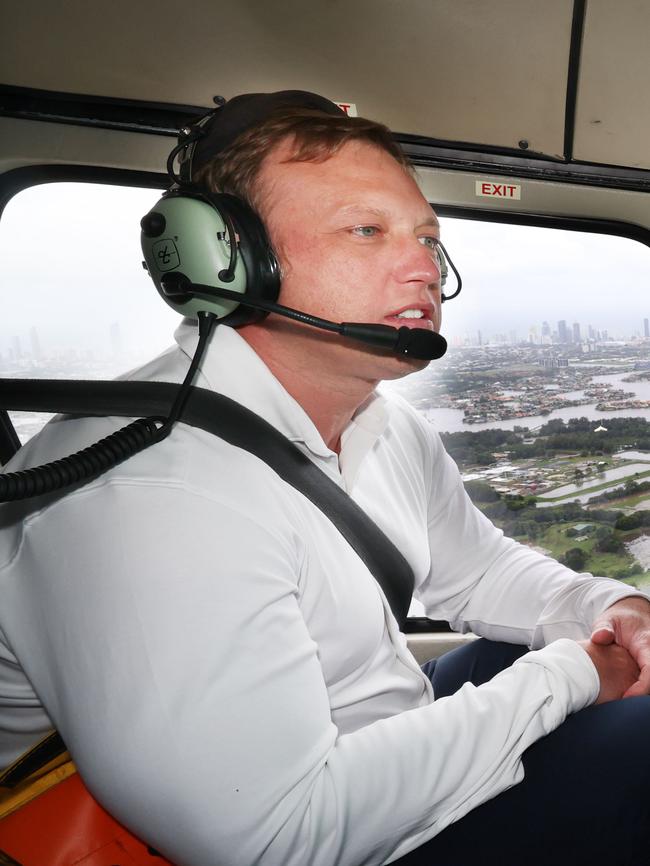Editorial: Leadership needed in times of crisis
The leaders of both sides of politics will be needed in the weeks ahead, as Queensland fights back from yet another round of natural disasters, writes the editor.
Opinion
Don't miss out on the headlines from Opinion. Followed categories will be added to My News.
Queenslanders are a resilient people and that is fortunate given the regularity of natural disasters in this state.
When John Oxley sailed up the Brisbane River 200 years ago, the Europeans who began settling Queensland had no real understanding of just how tempestuous the natural world would turn out to be, even if they had ample warnings from the Indigenous people whose camps on the Brisbane River always seemed to be above the flood line.
As the state government’s own Queensland Flood History makes clear, districts across the state have been seriously impacted by floodwaters in every decade since at least the 1840s.
Yet the state endures, cleaning up, rebuilding and making ever more creative and energetic efforts to improve future fortunes when the heavens open and the heavy rains arrive.
Clermont, in the Central West, just by way of example, was entirely rebuilt on higher ground after the floods of December 1916 destroyed the town and killed more than 60 people.
In the last few weeks, floods and storms have caused heartache for thousands of Queenslanders from the Far North, where residents were hit by the fallout from Cyclone Jasper, to the southeast in a brutal sequence of storms.
Families in the southeast whose homes were destroyed on Christmas night are still struggling to find accommodation, while thousands more households are entering their second week without power.
Calls like the one made by Central Queensland-based LNP senator Matt Canavan for the military to come to the aid of flood victims are understandable, and there is a case to be made for such an option.
But it was only last April that the Defence Strategic Review warned against Australia’s increasing reliance on the military to clean up after disasters when the military’s primary task is to win wars.


Defence should be the last resort when it comes to domestic aid to the civil community, the review declared bluntly.
There are also numerous small businesses scattered throughout the state with expertise in flood recovery which must be taken into account if the military is deployed.
Even the federal government’s Disaster Resilience Handbook Collection suggests that, when government-funded agencies come to the rescue, they must be mindful of hiring local contractors and retaining skilled workers through paid employment.
Meanwhile, our state leaders, particularly Opposition Leader David Crisafulli, have not been letting a crisis go to waste.
Mr Crisafulli has been out and about on the Gold Coast, refusing to take a Christmas break and posting some of his movements on social media while demanding more assistance packages from both state and federal governments.
Premier Steven Miles – and his minders – will not have forgotten that Scott Morrison’s holiday trip to Hawaii during the 2019 bushfire emergency did not meet with the electorate’s expectations of leadership in a crisis. That lesson learnt, it was good to see Mr Miles swiftly return on Tuesday from his own short break (spent locally) to meet with emergency services personnel and to hold a press conference – despite still being technically on leave until Thursday.
Both leaders will be needed in the weeks ahead. They should comfort the flood-afflicted – that’s part of their job.
But both should also highlight the demonstrated capacity of this state to face down adversity and rebuild homes and communities, getting on with lives even in the knowledge that these disasters have always been part of life in Queensland and always will be.
CASE FOR FLEXIBILITY MUST BE EXPLAINED
The Queensland government has got its work cut out if it wants parents to embrace “flexible school hours”, including a possible four-day week.
The department of education sent a blueprint to all state school principals last November, that would enable schools to change class times or shorten the week to aid teacher availability and student wellbeing.
But according to our exclusive engagement poll, most Queenslanders (88 per cent in fact) are dead against the proposal.
While many may be against the plan because of the need to organise an extra day of childminding, it’s clear the possible learning benefits of flexible hours haven’t been properly explained.
Wisdom College Calamvale principal Damien Barry says flexibility works.
“Every Wednesday we have Year 11 and 12 students either at home studying, studying at TAFE, working, or on work experience placements,” he said.
It makes sense, but Education Minister Grace Grace and her department now need to spread that message to parents.
Responsibility for election comment is taken by Chris Jones, corner of Mayne Rd & Campbell St, Bowen Hills, Qld 4006. Printed and published by NEWSQUEENSLAND (ACN 009 661 778). Contact details here
Originally published as Editorial: Leadership needed in times of crisis


